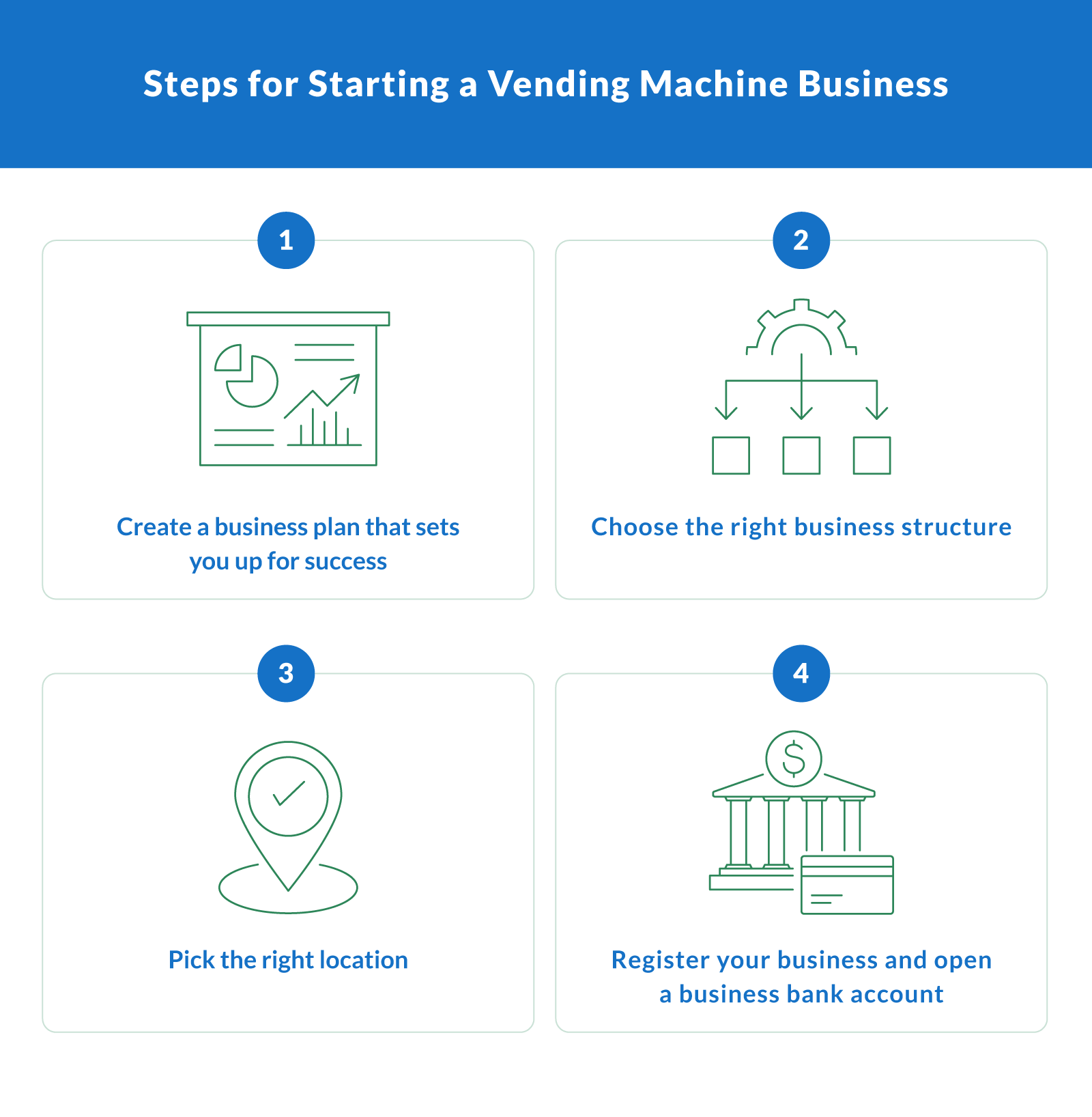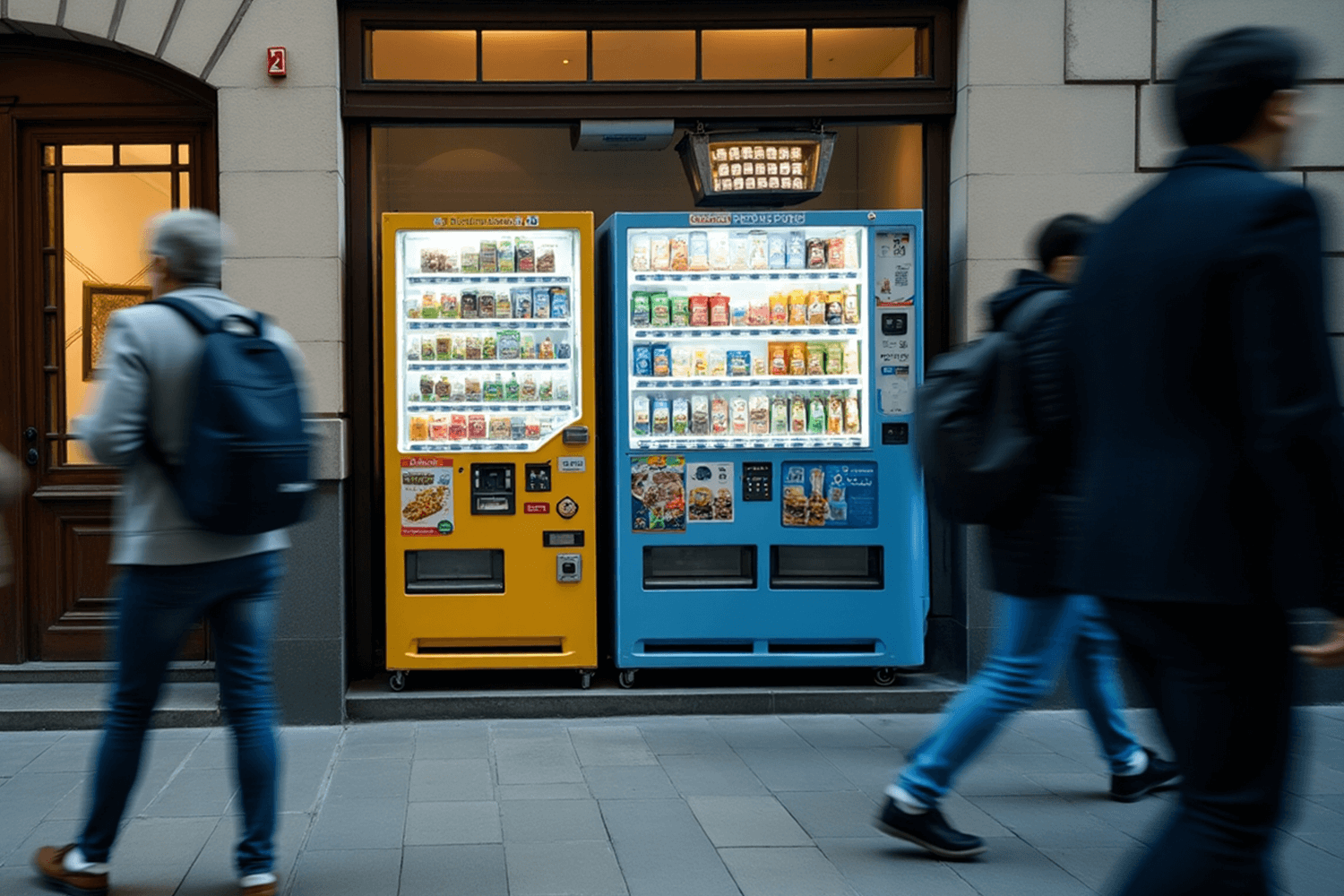Ever wondered if those vending machines you see everywhere could be your ticket to financial independence? In 2025, vending machines offer entrepreneurs an accessible entry point into business ownership with fairly low startup costs and flexible time commitments.
This comprehensive guide walks you through everything you need to know about starting a profitable vending machine business, from choosing the right machines to securing prime locations and scaling your operation. Whether you're looking for a side hustle or full-time business, you'll learn how to navigate common challenges, maximize profits, and build a sustainable vending business that generates income while you sleep.
Why Start a Vending Machine Business in 2025
The 2025 vending machine industry offers entrepreneurs an accessible entry point into small business ownership. Vending machines can generate passive income with relatively low barriers to entry.
A vending machine business offers several benefits:
Flexibility in scale. Whether you're looking to replace your full-time income or just want a profitable side hustle, vending machines can be tailored to your availability.
Low overhead costs. Unlike traditional retail businesses, vending machines don't require staffing, extensive real estate costs, or complex operations.
Passive income potential. Once established, your vending business can generate revenue 24/7 without your constant presence.
Scalability options. Start with one machine and expand your vending machine business as your experience grows.
Minimal day-to-day involvement. For busy entrepreneurs, the limited time commitment makes this business model accessible.
Recent trends have strengthened the vending business case. Contactless payment technology has revolutionized the industry, with consumers expecting cashless options. Today's smart vending machines also provide real-time inventory tracking, so vending machine operators can easily optimize their product mix.
Is a Vending Machine Business Profitable?
For aspiring entrepreneurs considering a vending machine business, profitability is a primary concern. With proper planning and execution, vending machines can deliver attractive profit margins for small business owners.
The average profit margin for vending machine operators typically ranges from 20% to 30%, depending on product selection and location quality. Return on investment timelines vary based on machine type and location, with well-placed machines potentially recouping their initial investment within 18 months.
How Much Does It Cost to Start a Vending Machine Business?
Understanding the startup costs for a vending machine business is essential for proper planning. One of the most appealing aspects of this business model is its low startup costs compared to many other small business opportunities.
The most significant upfront expense is purchasing the machines themselves:
Basic snack machines. These typically range from $3,000-$5,000 new.
Combination snack/beverage machines. There are many types of vending machines to consider. Expect to invest $3,000–$5,500 for new models.
Specialty vending machines. These can cost $5,000-$15,000 or more, depending on features.
Used vending machines are a viable alternative for entrepreneurs looking to minimize initial investment. Quality used machines can often be found for less than new models on platforms like Craigslist and eBay, reducing your startup costs considerably.
Additional expenses to consider include:
Inventory stocking ($200–$500 per machine)
Credit card reader installation ($300-$600 per machine)
Ongoing monthly fees (around $7.95–$10 per month)
Transaction fees (typically 2–6% per transaction)
Business license fees ($100–$500; varies by city and state, and may include per-machine fees)
Vending machine permit (cost varies widely by state — sometimes $71–$125 base + $9–$26 per machine; may also need health permits or seller's permits)
Insurance premiums ($500–$1,200 for general liability coverage)
For a vending machine company starting with two to three machines, expect total initial costs between $5,000 and $15,000, depending on whether you choose new or used equipment.
Step-by-Step Guide to Starting a Vending Machine Business

Ready to launch your vending machine business in 2025? This walkthrough will guide you through the key steps. Starting a small business in the vending industry doesn't require extensive experience — just careful planning and execution.
The path to a successful vending machine business involves several key stages, from initial planning to ongoing management.
Create a Business Plan That Sets You Up for Success
A solid business plan is your roadmap to vending success. It helps you clarify your vision, identify potential pitfalls, and create achievable milestones for your business.
Your vending business plan should include these essential elements:
Business model details. Decide whether you'll focus on snacks, beverages, or specialty items, and if you'll operate part-time or full-time.
Target market definition. Identify the specific customers you'll serve and their purchasing habits.
Competitive analysis. Research other vending businesses in your target area to find your unique advantage.
Financial projections. Estimate startup costs, ongoing expenses, and expected revenue for at least the first year.
Growth strategy. Plan how you'll expand from your first machine to a successful vending machine business.
Choose the Right Business Structure
Selecting the appropriate business structure affects your taxes, personal liability, and operational flexibility. For most vending machine business owners, forming a limited liability company (LLC) offers the best balance of benefits.
An LLC provides these advantages:
Liability protection. Your personal finances remain separate from business debts and legal issues.
Tax flexibility. Choose how your business is taxed, potentially reducing your overall tax burden.
Credibility boost. An LLC structure signals professionalism when securing new locations and working with property owners.
Operational simplicity. Less paperwork and fewer formalities than corporations, while maintaining important protections.
Alternative structures include sole proprietorship (simplest but offers no liability protection) and corporation (more complex but beneficial for large-scale operations). Consider consulting with a tax professional before deciding, so your vending machine business structure aligns with your long-term goals.
Pick the Right Location
Location selection can make or break your vending machine business. The right location combines high foot traffic with the right customer demographics for your product selection.
Conduct thorough market research to identify promising placement opportunities:
High-traffic areas. Look for locations with consistent foot traffic throughout the day or during specific high-volume periods.
Complementary businesses. Places where your offerings match customer needs (snacks near gyms, coffee in office buildings).
Competitor assessment. Areas underserved by existing vending options present prime opportunities.
Demographic alignment. Match your product selection to the preferences of people in each location.
Top potential locations include:
Apartment complexes
Hotels
Office buildings
Gyms
Schools
Manufacturing facilities
When approaching property owners, come prepared with a professional proposal highlighting the benefits to their tenants or customers, your maintenance schedule, and your commission structure.
Register Your Business and Open a Business Bank Account
Proper registration establishes your vending machine business as a legitimate operation and helps you avoid legal complications down the road.
Follow these steps to register your small business:
Choose a business name. Select something memorable that reflects your vending focus, then check availability with your state's business registry.
Register with state authorities. File the necessary paperwork with your Secretary of State's office to establish your business entity.
Obtain a business license. Check with local authorities about required permits and licenses for vending operations.
Get a tax ID number. Apply for an Employer Identification Number (EIN) from the IRS for tax purposes.
Register for sales tax. Most states require vending machine businesses to collect and remit sales tax.
Once registered, open a dedicated business bank account to separate personal and business finances. This separation is essential for accurate accounting, simplified tax preparation, and maintaining the liability protection provided by your business structure.
How To Avoid Common Vending Business Pitfalls

While a vending machine business offers great potential, new entrepreneurs should be aware of common challenges that can impact profitability.
As one Reddit user points out, "People steal from vending machines. They require an active internet connection and digital payment reader to process payments because people rarely carry cash nowadays."
Understanding this and other common pitfalls helps business owners develop strategies to overcome them. The most significant challenges facing vending business operators include:
Vandalism and theft. Protect your investment with security cameras, vandal-proof machines, and strategic placement in well-lit, monitored areas.
Location instability. To avoid a sudden loss of placement, get location agreements in writing with clear terms about duration, notice periods, and commission structures.
Inventory management. Establish regular restocking schedules and monitor product performance to minimize waste and maximize profits.
Technology issues. Maintain reliable internet connections for digital payment systems and regularly update software to prevent transaction failures.
Rising overhead costs. Track all expenses carefully and negotiate with suppliers for volume discounts to maintain healthy profit margins.
Successful vending machine company owners also understand that consistent maintenance is crucial. Another Reddit user notes, "You have to service machines, do homework on product, alternate slow moving products so customers have a reason keep checking back, keep up with changes in ownership of the locations, etc." This hands-on approach helps prevent many common problems before they impact your bottom line.
When and How To Scale Your Vending Business
Knowing when and how to expand your vending machine business can be the difference between modest success and significant profitability. Look for these key indicators that you're ready to add to your number of machines:
Consistent profitability. Your existing machines have maintained steady profits for at least six to eight months.
Streamlined operations. You've established efficient restocking and maintenance routines.
Location opportunities. You've identified additional promising locations through your networking efforts.
Financial readiness. You have capital available or access to financing options.
When scaling, successful vending machine business owners follow strategic growth principles rather than expanding randomly. Increase your machine count gradually, focusing on establishing clusters of machines in nearby locations to minimize travel time and maximize servicing efficiency. Once you have about 15 or 20 machines, consider hiring part-time help to maintain quality service without burning out.
Use performance data from your existing machines to guide expansion decisions. Your most profitable products and locations provide valuable insights for your new vending machine placements.
Get the Funding You Need
Once you're off the ground, securing adequate financing helps you grow your vending machine business. Clarify Capital offers several loan products designed specifically for small business owners who have been in business for six months or more:
Short-term business loans. Get quick access to capital with repayment terms ranging from 3-18 months.
Business lines of credit. Flexible funding you can draw from as needed for inventory purchases or machine acquisition.
Working capital loans. Finance day-to-day operations while building your customer base.
Equipment financing. Purchase vending machines with the equipment itself serving as collateral.
To apply for funding through Clarify Capital, you'll need to provide three months of recent bank statements, proof of at least $10,000 in monthly revenue, and verification that your business has been operating for at least six months. With a credit score of 500 or higher, you can get approved quickly and access capital in as little as 24 hours.
FAQs About Starting a Vending Machine Business
Here are answers to the most common questions entrepreneurs ask when considering entering the vending machine business:
Do I Need To Form A Limited Liability Company For My Vending Machine Business?
While not required, forming an LLC provides valuable liability protection and potential tax benefits. Consult with a business attorney about your specific situation.
What Profit Margin Can I Expect From A Vending Machine Business?
Typical profit margins range from 20% to 30%, depending on product selection, location quality, and operational efficiency.
How Much Does It Cost To Start A Vending Machine Business?
Startup costs typically range from $5,000-$15,000 for two to three machines, including equipment, inventory, business registration, and initial operating expenses.
What's The Biggest Downside to Running A Vending Business?
Location instability and machine maintenance requirements are the most common challenges. Success requires regular attention to inventory management and equipment upkeep.
How Long Until My Machines Become Profitable?
Well-placed machines in optimal locations typically reach full investment recoupment in around 18 months.
How Many Machines Do I Need For A Full-Time Income?
If well-performing machines average $500 monthly profit each, you'll need around 10 strategically placed units to generate a $5,000 monthly income. Your results will vary based on location quality and product selection.
Is a Vending Machine Business Right for You?

A vending machine business offers a compelling opportunity for entrepreneurs who need flexibility and growth potential with manageable startup requirements. The combination of passive income potential and scalability makes this business model attractive to both new small business owners and experienced entrepreneurs looking to diversify.
The vending business rewards those who take a methodical, research-driven approach. Start by creating a solid business plan, securing quality locations, and establishing efficient operational systems. From there, you can gradually expand your machine count as your experience and capital grow.
What makes the vending machine business stand out from other business ideas is its adaptability to your goals and lifestyle. With proper planning and execution, you could be generating passive income from your own vending business within months.
Ready to secure funding to grow your vending machine business? Apply for funding through Clarify Capital today.

Michael Baynes
Co-founder, Clarify
Michael has over 15 years of experience in the business finance industry working directly with entrepreneurs. He co-founded Clarify Capital with the mission to cut through the noise in the finance industry by providing fast funding and clear answers. He holds dual degrees in Accounting and Finance from the Kelley School of Business at Indiana University. More about the Clarify team →
Related Posts





